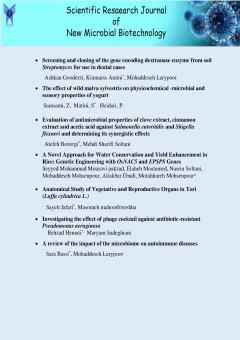Investigating the effect of phage cocktail against antibiotic-resistant Pseudomonas aeruginosa
Subject Areas : MicrobiologyBehzad Hemati 1 * , Maryam Sadeghiyani 2
1 - عضو هیات علمی گروه علوم دامی دانشگاه آزاد اسلامی واحد کرج
2 - .
Keywords: Keywords: Pseudomonas aeruginosa, lytic bacteriophage, phage cocktail, resistant strains,
Abstract :
Introduction: Today, with the increase in the resistance of pathogenic bacteria to all kinds of antibiotics and the spread of antibiotic-resistant strains and the increase in the percentage of deaths resulting from them, it seems very necessary to find new solutions to deal with resistant strains. One of these solutions is the use of phage cocktails (a collection of two or more bacteriophages) that specifically and without harming the cells of the human or animal host body cause the destruction of the bacteria causing the infection. The aim of this study is to isolate and investigate the effect of lytic bacteriophages against Pseudomonas aeruginosa from hospital wastewater. Methods: In this study, the wastewater sample was taken from the wastewater inlet of one of the hospitals located in Karaj city and transferred to the research laboratory of the university. After preparing the phage cocktail, two strains of Pseudomonas aeruginosa ATCC27853 and RTCC1474 were used. The presence of bacteriophage and the sensitivity of the target bacteria to bacteriophage were confirmed by two-layer culture and spot test methods and the observation of plaques and clear halos in the environment, and imaging was done using an electron microscope. Results: The presence of two phages with the size of 50 and 80 nm was confirmed by observing with an electron microscope, which corresponded to the characteristics of two families of phages called tectoviride and cystoviride. Conclusion: Considering the resistance of both bacterial strains to antibiotics, these phages can be used to eliminate the pathogenic and antibiotic-resistant Pseudomonas aeruginosa bacteria.
1. Amini B, Kamali M, zarei A, bayat E, Javadi h, Mansuri M, Farhadi N. Isolation and Rapid Identification of Peudomonas aeruginosa through PCR Bio Sci Qtr Azad Uni of Zanjan 2013 Winter, (3): 59-65
2. Taghinekhad J, Molaee Kohneh Shahri SH, Hosseinzadeh M, Javan Jasur V. Qtr J of Laboratory and Diagnosis 2015 Winter (34): 67-82
3. Qin S, Xiao W, Zhou C, Pu Q, Deng X, Lan L, et al. Pseudomonas aeruginosa: pathogenesis, virulence factors, antibiotic resistance, interaction with host, technology advances and emerging therapeutics. Signal Transduct Target Ther. 2022;7(1):1–27.
4. Azizian R, Askari H . The Use of Phage as a Specialized Antibiotic Against Lethal Methicillin-Resistant Staphylococcus aureus. Sci J Ilam Univ Med Sci. 2013;
5. Arumugam S, Manohar P, Sukumaran S, Sadagopan S, Loh B, Leptihn S, et al. Antibacterial efficacy of lytic phages against multidrug-resistant Pseudomonas aeruginosa infections in bacteraemia mice models. BMC Microbiol [Internet]. 2022;22(1):1–7. Available from: https://doi.org/10.1186/s12866-022-02603-0
6. Hatfull G, Dedrick R, Schooley R. Phage Therapy for Antibiotic-Resistant Bacterial Infections. Annu Rev Med. 2022;73:197–211.
7. Nasr-Esfahani B, Roshnaei M, Fazeli H, Havaei A, Moghim Sh, Ghasemian-Safaei H et al. The Effect of Isolated Bacteriophage on Multi-Drug Resistant (MDR) Pseudomonas Aeruginosa. J Isfahan Med Sci 2014; 2014.
8. Rahimzadeh G , Farshidi F. Phage Therapy in Treatment of Gram-negative Bacterial Infections: A Systematic Review. J Mazandaran Univ Med Sci 2018;28; 2018. p. 203–12.
9. Rahimzadeh G, Saeedi M, Farshidi F, Rezai MS, Infectious P, Sciences M, et al. Phage Therapy in Tereatment of Gram-negative Bacterial Infection : A Systematic Review. J Maz Uni Med Sci. 2018;28(165):203–12.
10. Chegini Z, Khoshbayan A, Taati Moghadam M, Farahani I Bacteriophage therapy against Pseudomonas aeruginosa biofilm:A review. Annals of Clinical Microbiology and Antimicrobials REVIEW; 2020.
11. Molla Ahmadian Kaseb A. Isolation of Bacteriophages Treatment of Infection Caused by Pseudomonas aeruginosa as an Aiternative for Antibiotics. Thsis submitted to receive the degree of Master of Sciences in Micribiology
12. Shokri D, Soleimanidelfan A, Moayednia R, Mobasherizadeh S, Shirsalimian M, Enayatollahi S EJ. Isolation Identification and Evaluation of Two Lytic Bacteriophages Against Clinical Antibiotic-Resistant Strains of Pseudomonas aeruginosa from Waste Water and Hospital Sewage of Isfahan City. Sci J Ilam Univ Med Sci [Internet]. 2015;23:164–72. Available from: www.SID.ir
13. Dorri K, 1, Farzan Modaresi2*, Mohammad Reza shakibaie3 EM. Frequency of Gene-Producing Strains (aprA, rhlI, rhlR, algD) in Clinical.pdf. Pars Journal of Medical Sciences,Vol.20,No.2,Summer 2022; 2022. p. 39–47.
14. Khajekaramodin M, fazlibazaz B, Ebrahimi M, Ghazvini K, Afzal Aghayee M, Naderinasab M, et al. Enrichment and Isolation of Lytic Bacteriophages againet Antibiotic-resistant Peseudomonas aeruginosa Isolates .Iranian Journal of Medical Microbiology ,No 2,3, Summer and Winter 2008, p. 66-72
15. Vinodkumar C, Kalsurmath S, Neelagund Y. Utility of lytic bacteriophage in the treatment of multidrug-resistant Pseudomonas aeruginosa septicemia in mice. Indian J Pathol Microbiol. 2008 Jul 1;51(3):360–6.
16. Pires D, Sillankorva S, Faustino A, Azeredo J. Use of newly isolated phages for control of Pseudomonas aeruginosa PAO1 and ATCC 10145 biofilms. Res Microbiol [Internet]. 2011;162(8):798–806. Available from: https://www.sciencedirect.com/science/article/pii/S092325081100115X
17. Fei B, Li D, Liu X, You X, Guo M, Ren Y, et al. Characterization and genomic analysis of a broad-spectrum lytic phage HZ2201 and its antibiofilm efficacy against Pseudomonas aeruginosa. Virus Res [Internet]. 2023;335(April):199184. Available from: https://doi.org/10.1016/j.virusres.2023.199184
18. Abdelghafar A, , Ghada G, Momen S. A novel lytic phage exhibiting a remarkable in vivo therapeutic potential and higher antibiofilm activity against Pseudomonas aeruginosa. Eur J Clin Microbiol Infect Dis [Internet]. 2023;42(10):1207–34. Available from: https://doi.org/10.1007/s10096-023-04649-y
19. Furfaro L, Payne M, Chang B. Bacteriophage Therapy: Clinical Trials and Regulatory Hurdles. Front Cell Infect Microbiol. 2018;8(October):1–7.
20. Altamirano F, Barr J. Phage Therapy in the Postantibiotic Era. Clin Microbiol Rev [Internet]. 2019;32(2):e00066-18. Available from: https://journals.asm.org/doi/abs/10.1128/CMR.00066-18

